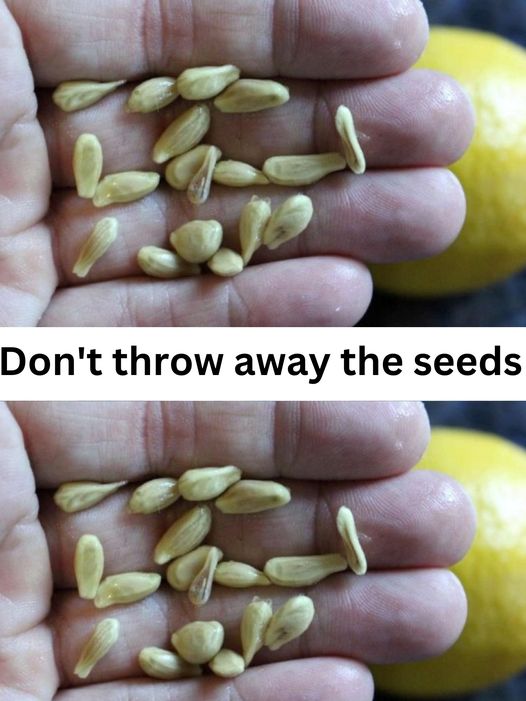Lemons are a staple in many kitchens, prized not only for their tart, refreshing flavor but also for their versatility. They are used to enhance dishes, add zest to desserts, and even provide a natural cleaning solution for various household chores. However, most people tend to overlook the value of lemon seeds, often discarding them without a second thought. But did you know that those tiny, seemingly insignificant seeds are actually packed with potential? By saving them and finding creative uses for them, you can unlock a whole range of benefits. Here’s a closer look at how lemon seeds, often discarded, can be put to good use in several practical and enjoyable ways.
The Power of Lemon Seeds: More Than Just Waste
Lemon seeds are rich in nutrients and have properties that make them useful in different areas of life, from gardening to aromatherapy and even natural health remedies. They contain essential oils and antioxidants, which can be harnessed for various purposes. In many ways, lemon seeds are a perfect example of how even the most seemingly insignificant items can be transformed into something valuable. Let’s explore some of the best ways to make the most out of lemon seeds.
How to Use Lemon Seeds in Gardening
One of the most popular ways to utilize lemon seeds is by growing your own lemon tree. With a little patience and care, you can cultivate a thriving lemon tree right from the seeds you would otherwise discard. This process not only offers the joy of growing your own fruit-bearing tree but also gives you the satisfaction of using something that would normally go to waste. Here’s a step-by-step guide to help you get started:
- Collect and Rinse the Seeds: After squeezing the lemon, gather the seeds and rinse them thoroughly in room temperature water. It’s essential to clean them well to remove any residual lemon pulp or juice. You can use a small strainer to make the process easier.
- Dry the Seeds: Once the seeds are clean, place them on a paper towel and allow them to dry completely. It’s important that the seeds are dry before you proceed to the next step, as excess moisture can prevent the germination process.
- Peel the Seeds: While not a necessary step, peeling the outer skin of the seeds can help improve the germination rate. Using a pair of tweezers, carefully remove the skin that covers the seed. This will allow the seed to sprout more easily.
- Prepare the Growing Environment: Fill a small container, such as a yogurt pot, with damp cotton. The cotton should be moist but not soaking wet. Place the seed on top of the cotton and ensure that it stays damp. Place the container in a warm, well-lit spot, but out of direct sunlight.
- Wait for the Seed to Germinate: After about seven days, you’ll begin to see a small sprout emerge from the seed. Continue to keep the cotton damp, and ensure that the environment remains warm and conducive to growth. Within a few weeks, you should start to see small roots developing as the sprout begins to grow into a small sapling.
- Transfer to a Pot: Once the sapling has developed roots, it’s time to transfer it to a small pot filled with a well-draining soil mixture. A combination of soil and perlite works well to ensure that the roots don’t become waterlogged. Gently plant the sprout into the soil, making sure the roots are well-covered but not too deep.
- Ongoing Care: The young lemon tree will need ongoing care to thrive. Keep it in a well-lit, warm location and ensure that the soil stays moist but not overly wet. As the tree grows, you’ll need to move it to a larger pot or even plant it outside if you live in a suitable climate. With time and patience, you’ll be rewarded with a beautiful, fruit-bearing lemon tree that provides fresh, homegrown lemons for your kitchen.
Lemon Seeds as a Natural Perfume for Your Home
Another creative use for lemon seeds is turning them into a natural perfume for your home. The seeds retain a fresh, citrusy fragrance even after they’ve been washed, making them perfect for adding a pleasant scent to your living spaces. Whether you’re trying to eliminate unpleasant odors or simply want to enhance the natural aroma of your home, lemon seeds can help. Here’s how to make the most of this idea:
- Collect and Rinse the Seeds: After using your lemon for cooking or baking, save the seeds and rinse them thoroughly under cold water. As with the gardening process, this will help remove any excess pulp or juice.
- Place the Seeds in a Canvas Bag: Once the seeds are clean, place them in a small canvas bag or sachet. A breathable material is ideal as it allows the seeds to release their natural fragrance gradually.
- Position the Sachet Around Your Home: Place the sachet of lemon seeds in areas of your home where you want to add a burst of citrus fragrance. This could be in drawers, cabinets, or closets to keep clothes smelling fresh, or in the bathroom to maintain a clean, inviting scent. The fragrance will be subtle but effective, especially when placed near heat sources like a radiator during the colder months.
- Refresh the Fragrance: Over time, the fragrance may fade. When this happens, simply remove the seeds from the bag, rinse them, and let them dry. You can then repeat the process or even mix the lemon seeds with other natural ingredients like dried lavender or rosemary for an enhanced scent.
Lemon Seeds in Natural Beauty and Health Remedies
In addition to their uses in gardening and home fragrance, lemon seeds have been touted for their potential benefits in natural beauty and health remedies. The essential oils and antioxidants found in the seeds can provide a variety of benefits, from improving skin health to acting as a natural remedy for digestive issues.
- Lemon Seed Oil for Skin Care: You can extract lemon seed oil by gently crushing the seeds and pressing them. This oil is known for its antibacterial and antioxidant properties, making it an excellent addition to skincare routines. It can be used to treat acne or other skin blemishes, as well as to rejuvenate dull skin by applying it topically. Be sure to dilute the oil with a carrier oil like coconut or olive oil before applying it to your skin to avoid irritation.
- Lemon Seed Tea: Another potential use for lemon seeds is to make a soothing tea. Boil a few lemon seeds in water and strain them before drinking. This tea can act as a mild detoxifier, helping with digestion and providing a boost of vitamin C. It may also have anti-inflammatory properties, making it a beneficial addition to your natural health regimen.
- Lemon Seed Powder for Health: If you have a dehydrator, you can dry the seeds and then grind them into a fine powder. This powder can be added to smoothies or other beverages to help boost your immune system and improve digestion. It’s rich in antioxidants and may help protect the body from harmful free radicals. Just a small amount of lemon seed powder can go a long way in supporting overall health.
Environmental Benefits of Using Lemon Seeds
By reusing lemon seeds instead of discarding them, you’re also making an environmentally friendly choice. Citrus waste, including seeds, can often end up in landfills where it takes time to decompose. By repurposing these seeds for gardening, home fragrance, or natural remedies, you’re reducing waste and contributing to a more sustainable lifestyle.
Additionally, growing your own lemon tree from seeds helps to support biodiversity and sustainability. With a little effort, you can cultivate your own tree, which will continue to provide you with fresh fruit for years to come. This not only benefits your household by reducing your reliance on store-bought lemons, but it also helps reduce the carbon footprint associated with commercial lemon production and transportation.
Conclusion: Don’t Throw Away the Seeds—They’re Worth Their Weight in Gold
Lemon seeds are much more than just waste. By saving and repurposing them, you can take full advantage of their many benefits, from growing your own lemon tree to creating natural perfumes and enhancing your health. Whether you’re a seasoned gardener, a DIY enthusiast, or someone simply looking for a more sustainable lifestyle, lemon seeds provide an easy and eco-friendly solution. The next time you squeeze a lemon, remember: those tiny seeds have incredible potential, and they are truly worth their weight in gold when used creatively.




